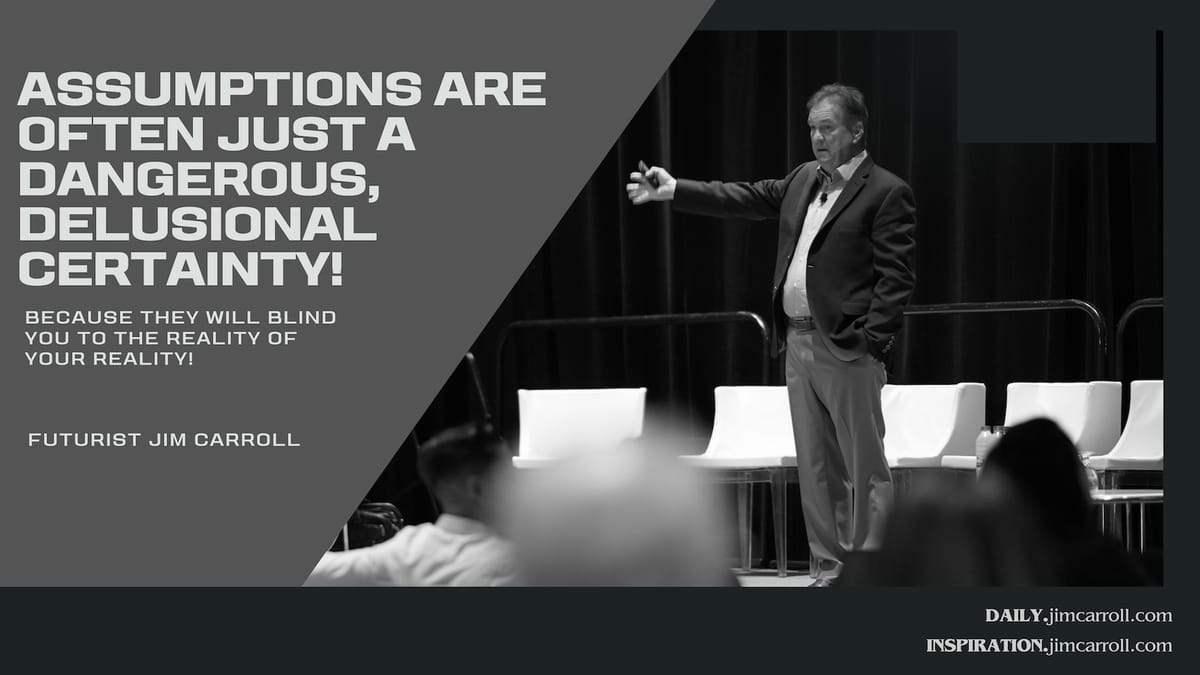"Assumptions are often just a dangerous, delusional certainty! (Because they will blind you to the reality of your reality!)" - Futurist Jim Carroll
Often, the thing that holds people back from their ability to get to tomorrow is their insane ability to hold to their beliefs, even in the face of absolutely fascinating compelling evidence to the contrary. One might often find that these are due to the assumptions that people cling to.
It's most often been the case with technology and the inevitable disruption that comes along with it. IBM chairman Thomas Watson famously predicted in 1943 that "there is a world market for maybe five computers." n 1995, Robert Metcalfe, the inventor of Ethernet, predicted the collapse of the Internet by 1996, which obviously did not happen. In 1977, Ken Olsen, the founder of Digital Equipment Corporation (DEC), stated with certainty, "There is no reason anyone would want a computer in their home."
Forecasting the future — particularly with technology — is a difficult thing to do. Many people have said that while it’s easy to predict the future, it’s another thing altogether to be right! Consider, for example, one fellow who in 1868 tried to alert residents of London, England, that they would soon face a very serious problem. Why? In his studies, he had looked at the city's population growth rate and then factored in the bathroom habits of the horses used for travel. His conclusion? In the not-too-distant future, most streets in the city would be six feet deep in manure!
Oops. He failed to see the arrival of a technology - automobiles - that would render irrelevant the potential problem. His assumption was at the core of his failed prediction.
The result of all this is that people often assume that tomorrow will be very much like today; that current trend lines will continue well into the future and that new trend lines won't appear; or they fall into the trap of being unable to see the dramatic shifts in those trends that result in something entirely different.
What comes about then, are the statements and attitudes - assumptions - that blind them to their emerging reality. Consider these winners in the assumption game:
- "Our product is so innovative, it doesn't need market research"
- "Our customers will always be loyal"
- "We don't need to worry about the competition"
- "Our technology is foolproof"
- "We can cut costs without affecting quality"
- "Our business model will never become obsolete"
- "We know what our customers want better than they do"
- "Our brand is invincible"
- "We can't fail because we're too big to fail"
Put these blind beliefs in the face of the accelerating change and the volatility that comes with it:
- your business assumptions might be changing faster than you are
- your timing of a trend might be way off
- your products are not aligned with the reinvention of the industry which is underway
- you are falling behind on customer expectations which are changing quickly because of new external factors
- products in your industry are being redesigned faster than ever before
- you are essentially structured for slow in the era of fast and can't keep up
- you don't have the right resources at the right time for the right purpose - your structure is outdated
- you have weak management teams that are more readily exposed to disruptive change
- you don't have agility at your core - you can't react quickly enough
- you aren't finding partners fast enough to do what needs to be done
- your leadership team is too old in a younger world
The result is that your planning is out of sync with your reality, your mindset exposes your flaws and weaknesses, your plans are going out of date faster, and the baseline trends impacting you are changing faster!
That's why you should never cling to your assumptions - you must be prepared to abandon them, avoid them, and ignore them. Get into a mindset of continuous assumption abandonment - never assume anything, anticipate everything, and always align with something!
Something else, something new, something unknown, and something unforeseen!
Futurist Jim Carroll realized a long time ago that assumptions don’t fit into the job description of a futurist.

